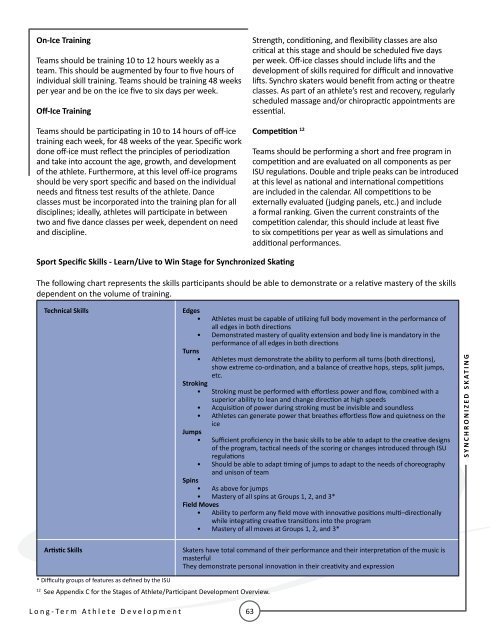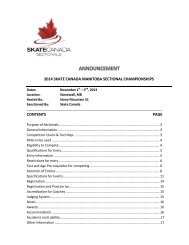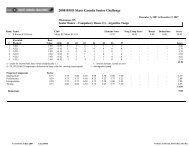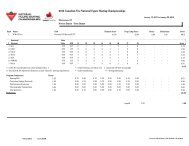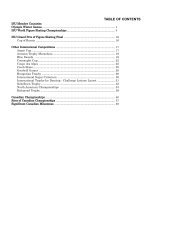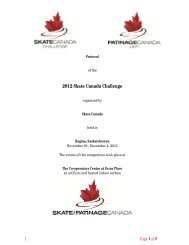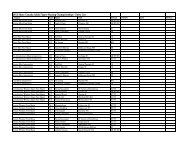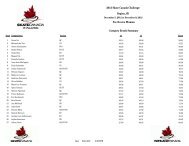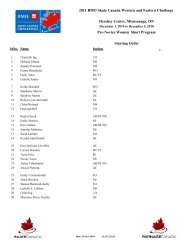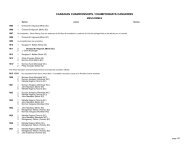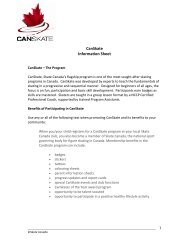LONG-TERM ATHLETE DEVELOPMENT - Skate Canada
LONG-TERM ATHLETE DEVELOPMENT - Skate Canada
LONG-TERM ATHLETE DEVELOPMENT - Skate Canada
Create successful ePaper yourself
Turn your PDF publications into a flip-book with our unique Google optimized e-Paper software.
On-Ice Training<br />
Teams should be training 10 to 12 hours weekly as a<br />
team. This should be augmented by four to five hours of<br />
individual skill training. Teams should be training 48 weeks<br />
per year and be on the ice five to six days per week.<br />
Off-Ice Training<br />
Teams should be participating in 10 to 14 hours of off-ice<br />
training each week, for 48 weeks of the year. Specific work<br />
done off-ice must reflect the principles of periodization<br />
and take into account the age, growth, and development<br />
of the athlete. Furthermore, at this level off-ice programs<br />
should be very sport specific and based on the individual<br />
needs and fitness test results of the athlete. Dance<br />
classes must be incorporated into the training plan for all<br />
disciplines; ideally, athletes will participate in between<br />
two and five dance classes per week, dependent on need<br />
and discipline.<br />
L o n g - Te r m A t h l e t e D e v e l o p m e n t<br />
Strength, conditioning, and flexibility classes are also<br />
critical at this stage and should be scheduled five days<br />
per week. Off-ice classes 865 Sheord should Road, include Ottawa, lifts Ontario and the K1J 1H9<br />
development of skills required for difficult and innovative<br />
lifts. Synchro skaters would benefit from acting or theatre<br />
classes. As part of an athlete’s rest and recovery, regularly<br />
scheduled massage and/or chiropractic appointments are<br />
essential.<br />
Phone 613.747.1007 I Toll Free 1.888.747.2372 I Fax 613.748.5718 I Toll Free Fax 1.877.211.2372<br />
63<br />
Competition 12<br />
Sport Specific Skills - Learn/Live to Win Stage for Synchronized Skating<br />
Teams should be performing a short and free program in<br />
competition and are evaluated on all components as per<br />
ISU regulations. Double and triple peaks can be introduced<br />
at this level as national and international competitions<br />
are included in the calendar. All competitions to be<br />
externally evaluated (judging panels, etc.) and include<br />
a formal ranking. Given the current constraints of the<br />
competition calendar, this should include at least five<br />
to six competitions per year as well as simulations and<br />
additional performances.<br />
The following chart represents the skills participants should be able to demonstrate or a relative mastery of the skills<br />
dependent on the volume of training.<br />
Technical Skills Edges<br />
• Athletes must be capable of utilizing full body movement in the performance of<br />
all edges in both directions<br />
• Demonstrated mastery of quality extension and body line is mandatory in the<br />
performance of all edges in both directions<br />
Turns<br />
• Athletes must demonstrate the ability to perform all turns (both directions),<br />
show extreme co-ordination, and a balance of creative hops, steps, split jumps,<br />
etc.<br />
Stroking<br />
• Stroking must be performed with effortless power and flow, combined with a<br />
superior ability to lean and change direction at high speeds<br />
• Acquisition of power during stroking must be invisible and soundless<br />
• Athletes can generate power that breathes effortless flow and quietness on the<br />
ice<br />
Jumps<br />
• Sufficient proficiency in the basic skills to be able to adapt to the creative designs<br />
of the program, tactical needs of the scoring or changes introduced through ISU<br />
regulations<br />
• Should be able to adapt timing of jumps to adapt to the needs of choreography<br />
and unison of team<br />
Spins<br />
• As above for jumps<br />
• Mastery of all spins at Groups 1, 2, and 3*<br />
Field Moves<br />
• Ability to perform any field move with innovative positions multi–directionally<br />
while integrating creative transitions into the program<br />
• Mastery of all moves at Groups 1, 2, and 3*<br />
Artistic Skills <strong>Skate</strong>rs have total command of their performance and their interpretation of the music is<br />
masterful<br />
They demonstrate personal innovation in their creativity and expression<br />
* Difficulty groups of features as defined by the ISU<br />
12 See Appendix C for the Stages of Athlete/Participant Development Overview.<br />
S Y N C H R O N I Z E D S K A T I N G


